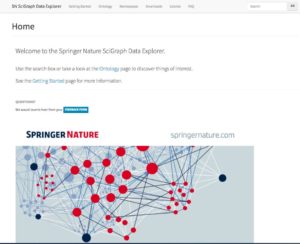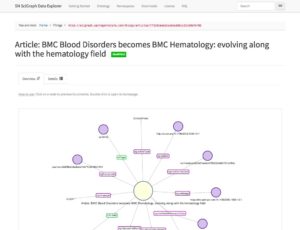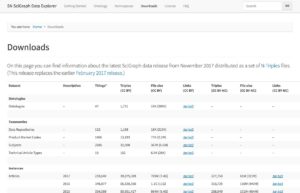Nov 2017
SciGraph publishes 1 billion facts as Linked Open Data
Last Thursday we reached a major milestone for the SciGraph project: nearly 1 billion facts (= RDF statements) have been released as Linked Open Data, most of it under a CC-BY license!
This data release follows and improves on the previous data release (February 2017) which included metadata for all journal articles published in the last 5 years.
What's in this release:
- Datasets downloads. Almost 1 billion triples (23.2 GB compressed, or 205.2 GB uncompressed) comprising our SciGraph ontology, SKOS taxonomies and instance data covering the complete archive of Springer Nature publications, i.e. books and journals (1801-2017), conferences, affiliations, funders, research projects and grants. The data is current to end of 2017Q3.
- Data Explorer. The data explorer allow users to visualize each single node in the graph and to move to other related nodes interactively. Furthermore, the Explorer allow users to get rich data descriptions for SciGraph things by traversing the knowledge graph and using content negotiation on SciGraph URLs. In other words, the Explorer is like a Linked Data API for developers: the RDF data is dereferenceable (Turtle, N-Triples, RDF/XML) and both HTTP and HTTPS protocols are supported.
- Dual Licence. The majority of SciGraph data is being released under a Creative Commons Attribution (CC BY) 4.0 International License, with a small portion of the data (specifically abstracts and grants) separately licensed under a Creative Commons Attribution-NonCommercial (CC BY-NC) 4.0 International License.
- Model Mappings. To align the SciGraph ontology with other well-known vocabularies we include several mappings and have used extensively two external datasets: ANZSRC (Australian and New Zealand Standard Research Classification) Fields of Research codes, and GRID (Global Research Identifier Database) identifiers.
Who is this for?
In general, for people who are interested in reusing our metadata e.g. for data analysis tasks, for developing applications that benefit from linking to Springer Nature content etc.. For example:
- * Researchers and (linked) open data enthusiasts i.e. see the Linked Data Cloud.
- * Metadata and information specialists e.g. librarians.
- * Developers and Data Scientists.
Furthermore, we are in contact with various organisations who are interested in reusing large parts of our datasets, e.g. Wikidata, DBpedia and EMBL-EBI.
Questions?
Any questions of feedback, leave a comment or email knowledge-graph@springernature.com.
We'd love to hear from you! Also, you can follow the #scigraph tag on twitter for last-minute news.
Cite this blog post:
Comments via Github:
See also:
2025
paper Enhancing the Accessibility of ORCID Public Data, now additionally hosted on Google BigQuery
4th International Conference on the Science of Science and Innovation, Copenhagen, Denmark, Jun 2025.
2019
paper Modeling publications in SN SciGraph 2012-2019
Workshop on Scholarly Digital Editions, Graph Data-Models and Semantic Web Technologies, Université de Lausanne, Jun 2019.
Second biennial conference on Language, Data and Knowledge (LDK 2019), Leipzig, Germany, May 2019.
2018
2017
paper Data integration and disintegration: Managing Springer Nature SciGraph with SHACL and OWL
Industry Track, International Semantic Web Conference (ISWC-17), Vienna, Austria, Oct 2017.
paper Using Linked Open Data to Bootstrap a Knowledge Base of Classical Texts
WHiSe 2017 - 2nd Workshop on Humanities in the Semantic web (colocated with ISWC17), Vienna, Austria, Oct 2017.
2016
paper Insights into Nature’s Data Publishing Portal
The Semantic Puzzle (online interview), Apr 2016.
2015
paper Learning how to become a linked data publisher: the nature.com ontologies portal.
5th Workshop on Linked Science 2015, colocated with ISWC 2015., Bethlehem, USA, Sep 2015.
2014
International Semantic Web Conference (ISWC-14), Riva del Garda, Italy, Oct 2014.
2013
New Technologies in Medieval and Renaissance Studies, (forthcoming). (part of the 'Envisioning REED in the Digital Age' collection)
2011
paper Browsing highly interconnected humanities databases through multi-result faceted browsers
Digital Humanities 2011 , Stanford, USA, Jun 2011.
2010
paper Data integration perspectives from the London Theatres Bibliography project
Annual Conference of the Canadian Society for Digital Humanities / Société pour l'étude des médias interactifs (SDH-SEMI 2010), Montreal, Canada, Jun 2010.
2009
paper Laying the Conceptual Foundations for Data Integration in the Humanities
Proc. of the Digital Humanities Conference (DH09), Maryland, USA, Jun 2009. pp. 211-215


